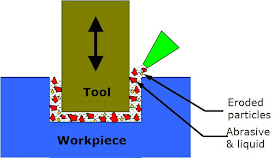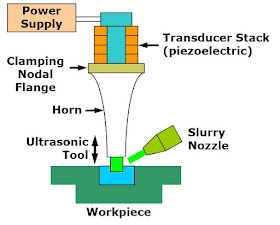Please Read :
- Abrasive Jet Machining Process
- Water Jet Machining Process .
- Laser Beam Machining
- Electrical Discharge Machining (EDM) Principles
Ultrasonic Machining (USM) Principles
Working principle of Ultrasonic Machining or Ultrasonic Impact Grinding is described with the help of a schematic diagram. The shaped tool under the actions of mechanical vibration causes the abrasive particles dipped in slurry to be hammered on the stationary workpiece. This causes micro-indentation fracture on th material.
Small abraded particles are removed along the surface which is perpendicular to the direction of the tool vibration. When the material is removed a cavity of the same profile of the tool face is formed. The abrasive particles gradually erodes as the machining process continues. As a result fresh abrasive particles are needed to be supplied in the machining zone. Abrasive particles associated with the liquid is fed to the m/c zone and it ensures the removal of the worn out grains and material.
Machining Time
The machining time of the ultrasonic grinding depends on the frequency of the vibration, material properties and grain size. The amplitude of the vibration may vary from 5 to 75 µm and frequency may vary from 19~25 kHz. Ample static force is also required to hold the job against the machining tool . A continues flow of abrasives suspension is also mandatory.
Advantages of USM:
1. It can be used to drill circular or non-circular holes on very hard materials like stones, carbides, ceramics and other brittle materials.
2. Non-conducting materials like glass, ceramics and semi precious stones can also be machined.
2. Non-conducting materials like glass, ceramics and semi precious stones can also be machined.
Disadvantages of Ultrasonic Machining :
1. It can be proved slower than the conventional machining processes.
2. Creating deep holes is difficult because of the restricted movement of the suspension.
3. It is arduous to select the perfect tool geometry for creating hole of certain dimension. The holes created may be of larger sizes because of side cutting.
4. High tool wear because of continues flow of abrasive slurry.
1. Hard and brittle materials can be machined like tungsten carbide, diamond and glass. These are difficult to machine in conventional m/c-ing process.
2. Wire drawing dies of tungsten carbide can be drilled by this process.
3. Circular as well as non-circular holes can be done with straight or curved axes.
4. It has been proved successful in machining geranium, silicon quartz and synthetic ruby etc.
4. It has been proved successful in machining geranium, silicon quartz and synthetic ruby etc.
Please Read :


This type of glass material work using boom lift, its ok for customer side react more satisfaction and their refered boom lift rental machine most of company and buying refered to Sendhamarai Engineering.
ReplyDeleteThis type of glass material work using boom lift, its ok for customer side react more satisfaction and their refered boom lift rental machine most of company and buying refered to Sendhamarai Engineering.
ReplyDeleteI liked the way you wrote the article. It was very straightforward and your knowledge on the subject is fantastic.
ReplyDeletealumina substrates
That you have shared Ultrasonic Machining (USM) Working Principles was very good. Thanks for sharing....
ReplyDeleteceramic machining services
You post is great to see for more check to our pipe threading machine manufacturers for your future support.
ReplyDeleteI have been reading many articles on the same issue but found this one uniquely written. You covered almost every point over the topic.
ReplyDeleteultrasonic drilling service
Very excellent write up and it actually provided me with information need in ultrasonic machining. Please could your attach references for this information? Thank you.
ReplyDeleteThanks for sharing such valuable content. Read the article and my understanding related to the topic got cleared. Keep posting such great content.
ReplyDelete